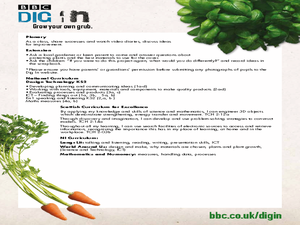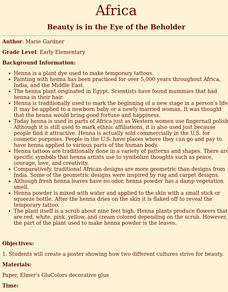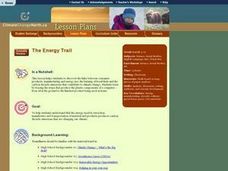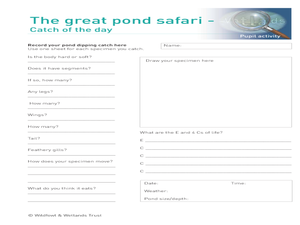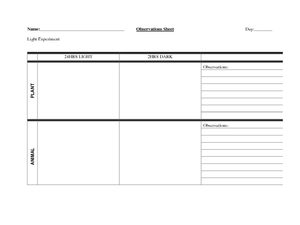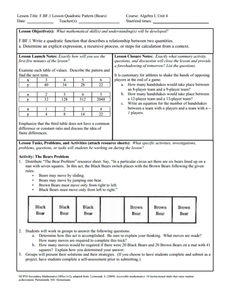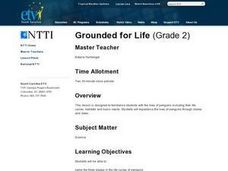Curated OER
Life Cycles of Mosses, Ferns, and Conifers
In this plant life cycle worksheet, students compare the life cycles of mosses, ferns, and conifers. This worksheet has 15 fill in the blank and 10 short answer questions.
Curated OER
Design Technology- Grow Your Own Grub
Students design a protective cover for outdoor plants. In this agricultural lesson, students use chicken wire, plastic sheeting, and empty bottles to construct a cover for lettuce leaves. Students take digital photos of their project.
Curated OER
Window Gardens
High schoolers use a plastic sandwich bag containing a damp paper towel taped to a window as a model system to observe the germination and early growth of radish seeds. They are challenged to pose a question about seed germination and...
Curated OER
Crime
Learners practice orally with the vocabulary of "crime." students read for detail and practice speaking in telling anecdotes.
Curated OER
Africa: Beauty is in the Eye of the Beholder
Students will create a poster showing how two different cultures strive for beauty. This lesson combines art and social studies in a meaningful way.
Curated OER
The Giving Tree Gives
Young scholars study both poetry and science in this language arts activity for early elementary, Special Education, and LEP students. They listen to Shel Silverstein's, The Giving Tree, and discuss its contents. They graph apple types,...
Curated OER
Butterflies Crossword Puzzle
In this science worksheet, students complete a crossword puzzle by writing in words related to the life cycle of a butterfly. Students review ten vocabulary words on this worksheet.
Curated OER
A Tree Is More than a Street Name
Eighth graders discuss the role of trees as one of the most important natural resources. In groups, they examine how the forests nearby helped to shape their urban city. Using the internet, they research the use of the forest in early...
Curated OER
Making the World a More Beautiful Place
Students discover how they can contribute in a positive manner in their community. In this service learning lesson, students experience literature through the lens of responsible citizenship.
Curated OER
Environment: Understanding Climate Impacts
Students investigate the potential environmental consequences of climate change. They conduct Internet research to discover how climate change may impact certain species of animals and present their findings in a poster or skit. Students...
Curated OER
The Energy Trail
Students examine the relationship between the products they use and energy use. Using the internet, they identify the role that manufacturing plays in using energy and the emissions that change the climate. They discover the steps to...
Curated OER
Water Cycle Boogie
Students explore the water cycle. They learn the "Water Cycle Boogie." Students create hats to represent the different parts of the cycle and learn hand motions to go with the words of the song. Students practice singing the song and the...
Curated OER
New Production Method Uses Far Less Energy Than It Creates
Twelfth graders explore the usage of alcohol fuel. In this Current Events lesson, 12th graders research the issue of using this type of energy. Students complete a worksheet on their research.
Curated OER
Pond Safari
Students investigate organisms and animals by examining a nearby pond. In this ecosystem instructional activity, students participate in a field trip to a local pond where they utilize a net to gather animals, plants and pollution items,...
Curated OER
Organisms – Their Needs
Students compare and contrast different organisms characteristics. In this life science lesson plan, students design an experiment about plants and animals needs. They collect data and write their conclusion about the experiment.
Curated OER
This Is Tree-rific!
Third graders view a clip of the video Backyard Safari, "Trees," and portray the life cycle of a tree. They also view a clip on structures of a tree and draw a diagram of a tree in their science journals.
Curated OER
Decomposing Artifacts
Seventh graders participate in an experiment in which they calculate the time of decomposition of different materials. In groups, they fill bags with different materials and cover them in soil. After six months, they create a line graph...
Curated OER
Bears
Pupils complete a variety of bear-related activities. They sort and graph teddy bears, distinguish between real and non-real bears and research bear life cycles and habitats.
Curated OER
Illinois' Habitats Happening
Learners use the scientific inquiry method to examine the ecosystems and biomes in Illinois. Using the characteristics of a local habitat, they identify the best conditions for an ecosystem to survive and how a slight change can damage...
Curated OER
Grounded for Life
Second graders become familiar with the lives of penguins including their life cycles, habitats and basic needs. Students will experience the lives of penguins through stories and video.
Curated OER
Amazing Aussie Animals
Fourth graders are introduced to Australian animals through a PowerPoint presentation. They choose an animal of interest and conduct in-depth research using several websites. They design a presentation with their findings.



